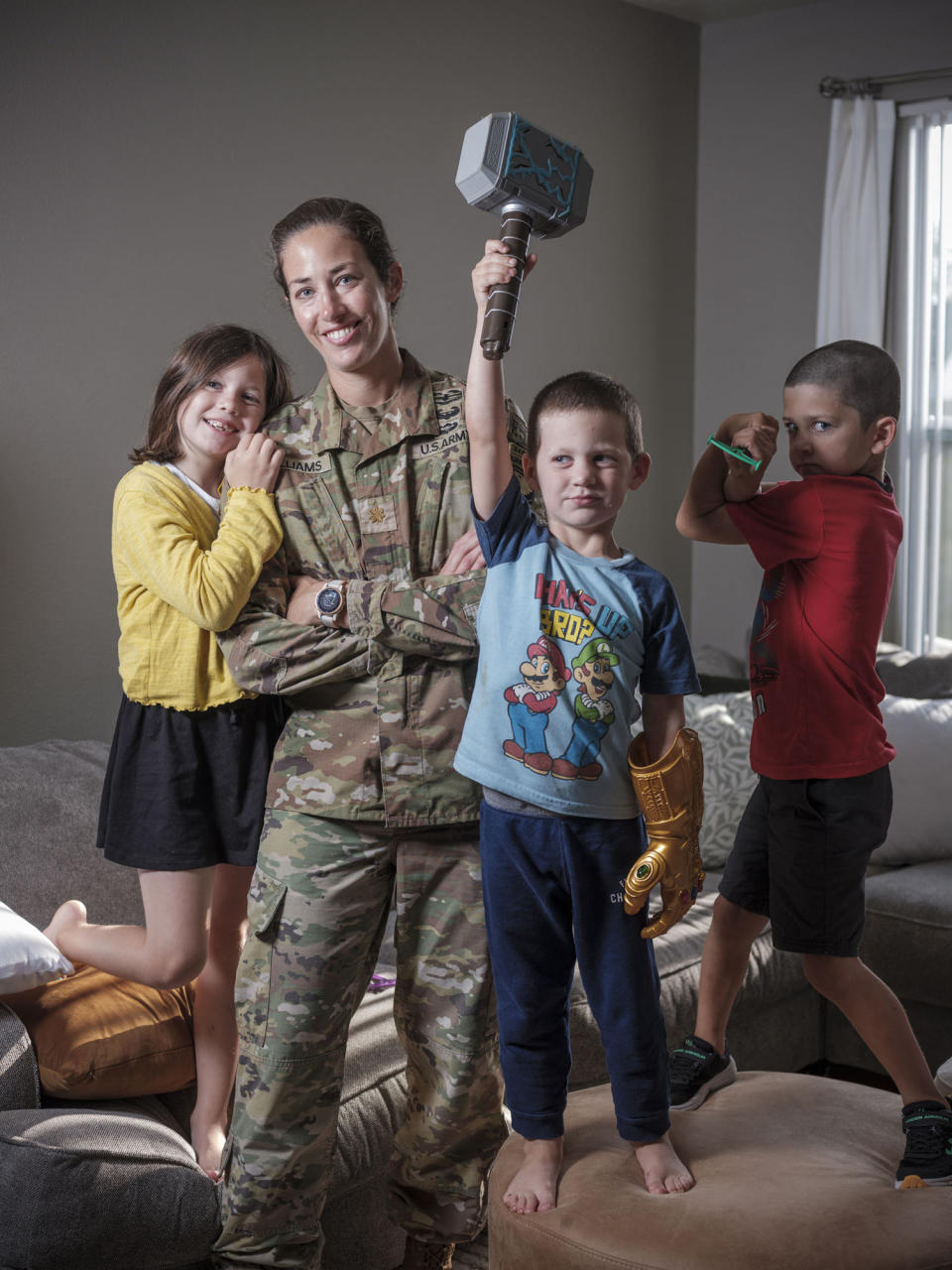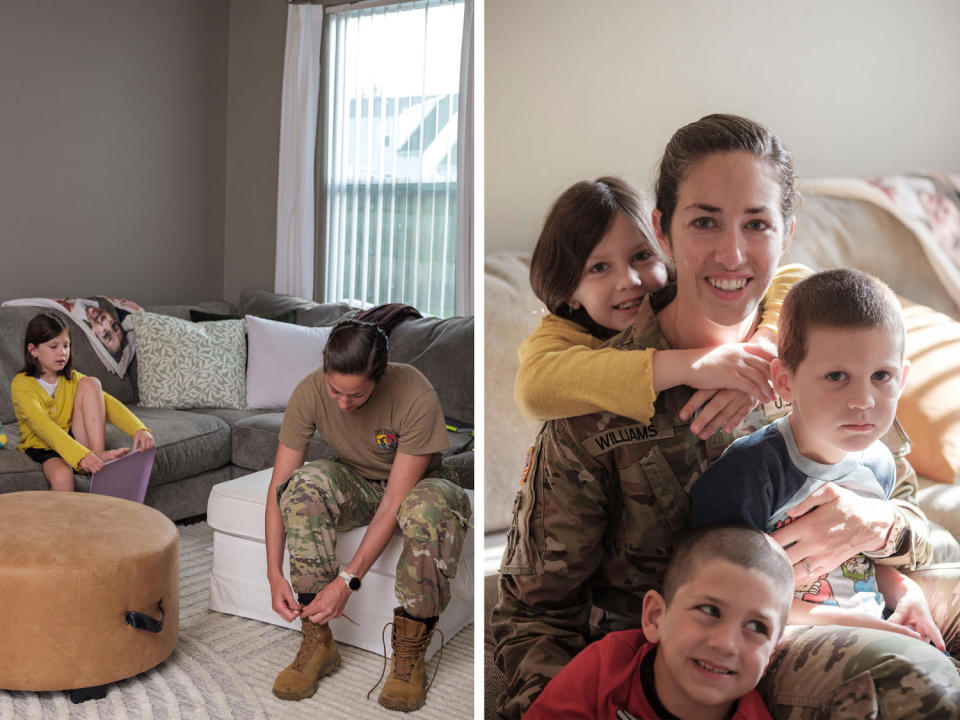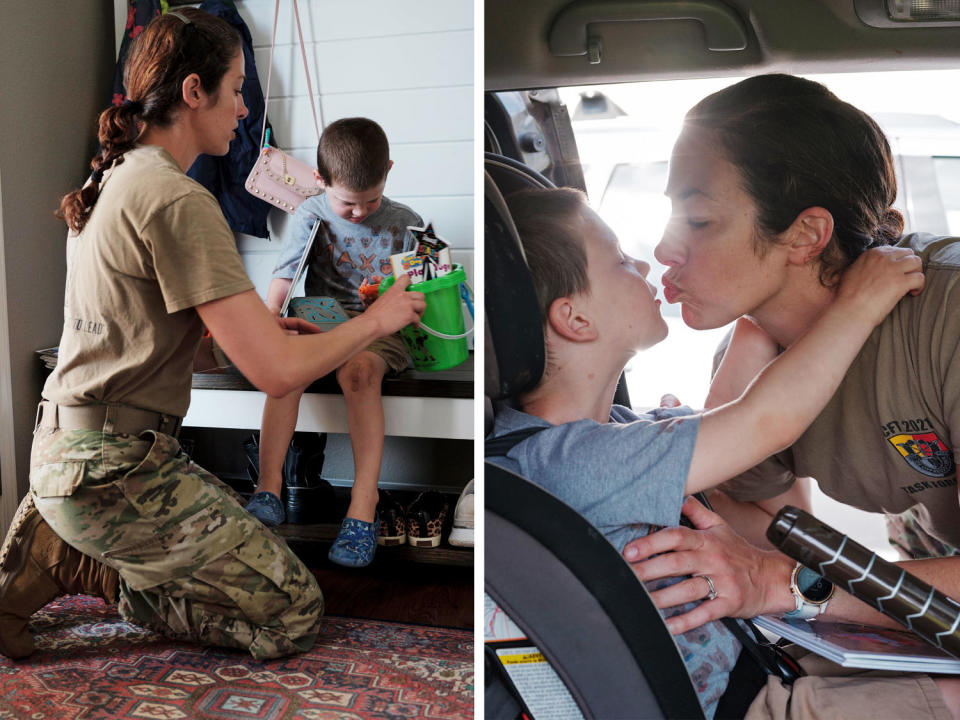America's child care shortage is pushing military families to a breaking point
Erin Williams has jumped out of airplanes, led a platoon in Afghanistan and earned an Ivy League degree with three young children at home. But the hardest thing to navigate in her military career is finding child care.
“Child care is the only thing that has made me consider leaving military service,” said Williams, an Army officer who is currently serving at Fort Campbell in Kentucky. “I’ve worked for awesome leaders, and I think I’ve done a good job leading, but the logistics and constant stress that come from child care is truly the hardest thing I’ve had to deal with.”

Families across the country have been increasingly struggling with the soaring cost of child care and monthslong waitlists after more than 100,000 workers left the industry and more than 16,000 child care centers permanently closed during the pandemic. But for military families — which frequently move on short notice, can be stationed in areas with few child care options, and work unconventional hours — the effects of those child care shortages have been magnified, with potentially wider consequences for the nation’s ability to retain its soldiers.“It puts a strain on the marriage and the family, and some of our service members are choosing not to re-enlist because of the child care challenges, among other things,” said Francisco Jamison, who spent nearly three decades working in military child care programs and is now the chief of military programs and strategy for Child Care Aware of America. “That’s a dangerous thing. To have that be a factor makes it a very tenuous situation for our mission readiness and certainly for the recruitment of service members going forward.”

The military has offered child care on its bases for several decades after Congress mandated in 1989 that the Defense Department develop its own formal child care system. The Pentagon now has the nation’s largest employer-run child care operation, providing subsidized child care to more than 200,000 children. But like other child care providers, it too has struggled to find enough workers since the pandemic, leaving around 9,000 children on monthslong waitlists for military-run child care centers.That has left military families with limited options. Privately run day cares, also struggling with worker shortages, can have waitlists that stretch one to two years — an impractical timeline for military families who often relocate with just a few months’ notice. Hiring a full-time babysitter can be a hefty financial strain, especially for service members with lower pay early in their careers.

Child care was among the top quality-of-life concerns listed by active-duty service members in a survey last year by Blue Star Families, a nonprofit that advocates for military families. The survey found that one-third of active-duty spouses said they can’t find the child care needed in order to work and that families with only one spouse working were more likely to struggle to afford basic necessities, like food.“In the 21st century, working-class and middle-class Americans need two incomes to meet their family goals,” said Kathy Roth-Douquet, the CEO of Blue Star Families and a military spouse. “Employment is the No. 1 concern for military spouses when they say what their concerns are about their current lifestyle, and it’s a top reason why people would consider leaving the military prior to retirement.”

Williams and her husband, also an Army officer, have had to relocate five times, with a move about every 16 months since having their first child seven years ago. Before each move, Williams said, she spends months researching child care options, getting on waitlists, making backup arrangements, and sending in hundreds of dollars for day care center deposits and application fees — only to have a few months before starting the process over again as she prepares for the family’s next move.“It is exhausting,” Williams said. “It’s exhausting to do once, let alone to know you’re going to have to do that again in a couple of months.”

Even once she’s found a solution, it can be quickly upended. Williams is preparing to spend an entire month’s salary on child care so she can attend an upcoming field training while her husband is deployed.Mia Reisweber, who works remotely in higher education and whose husband is also in the Army, said she’s been on a perpetual loop of child care waitlists for the past eight years. When her first son was born, she spent around a year on the waitlist for the base’s child care center and had to fly out her mother to help bridge the gap so she and her husband could return to work. When she learned she was pregnant with her second child, she immediately got on the waitlist for care at the Military Academy at West Point, two years before she anticipated her family might move there.
“The second I knew I was pregnant, and I mean the second, we were on the waitlist. That was, for me, a bigger priority than even making a doctor’s appointment,” Reisweber said.
Reisweber said she’s seen varying levels of support when it comes to addressing child care needs and supporting working spouses.
“We’ve got our pockets of supportive senior leaders who get it and who’ve endured the struggle themselves,” she said. “Then we’ve got the people who are like, ‘Just make the spouse stay home and take care of the kid.’”
The biggest barrier to expanding the number of children the Army can care for has been a shortage of workers, said Lt. Gen. Kevin Vereen, whose responsibilities include overseeing the Army’s child care operations. For the Army, which has around 4,500 children on its waitlists, about 23% of its child care positions are vacant, though that is an improvement from 2022, when about 37% of jobs were unfilled.

To help recruit child care workers, the Army has been offering bonuses of around $2,000, increased its wage to an average of $18 to $33 an hour, and begun offering discounted child care to workers at its centers along with access to lower-cost groceries sold at some of its bases’ commissaries. The Army also recently began offering weekend child care in 20 states for Army Reserve and National Guard members.“We are seeing a difference, and what we’re doing is making a difference when it comes to trying to get employees,” said Vereen.
One disadvantage the military has is the lengthy hiring process prospective employees can encounter, since the military requires its child care workers go through a background check and get clearance to work on a base, he said. That can add one to two months to the hiring process, time when workers can get competing offers from other employers.
The Air Force, which has about 3,700 children on its waitlists, has also started offering child care workers free tuition at its centers for one child and 25% off for additional children. The Air Force has proposed spending $40 million to construct new facilities and is working on other efforts to increase space and the number of providers.
Members of Congress have also proposed legislation to address the child care needs of military families, including a Senate bill intended to help child care providers near military installations boost their staffing. A bill in the House would pay for child care while a military spouse looks for work, which could help families that can’t afford child care because only one parent is working but are unable to get a job because they don’t have child care.

That could help military spouses like Alexandria Robinson. She said the struggle to find child care and the frequent moves have prevented her from working in the 14 years since she married her husband, despite being a registered nurse and having a degree in geospatial intelligence.“Child care is so very expensive. We’re here on a military salary, which doesn’t compete with the private sector,” said Robinson. “I see a lot of people struggling with ‘How do I pay for the child care that I need to get a job, but I don’t have a job to pay for the child care?’”
Robinson’s family is currently stationed in the Washington, D.C., region, where the demand is so high that the only children to receive spots at her husband’s base are those of single parents or parents who are both in the military, she said. The privately run day cares in the region average $24,000 a year. As a result, she says, she’s had to put her professional aspirations on hold indefinitely.
“I cannot think of another industry where the spouses are just expected to basically not pursue their own career, ever,” said Robinson. “I would like to have a turn; I’d like to pursue a career.”

This article was originally published on NBCNews.com

